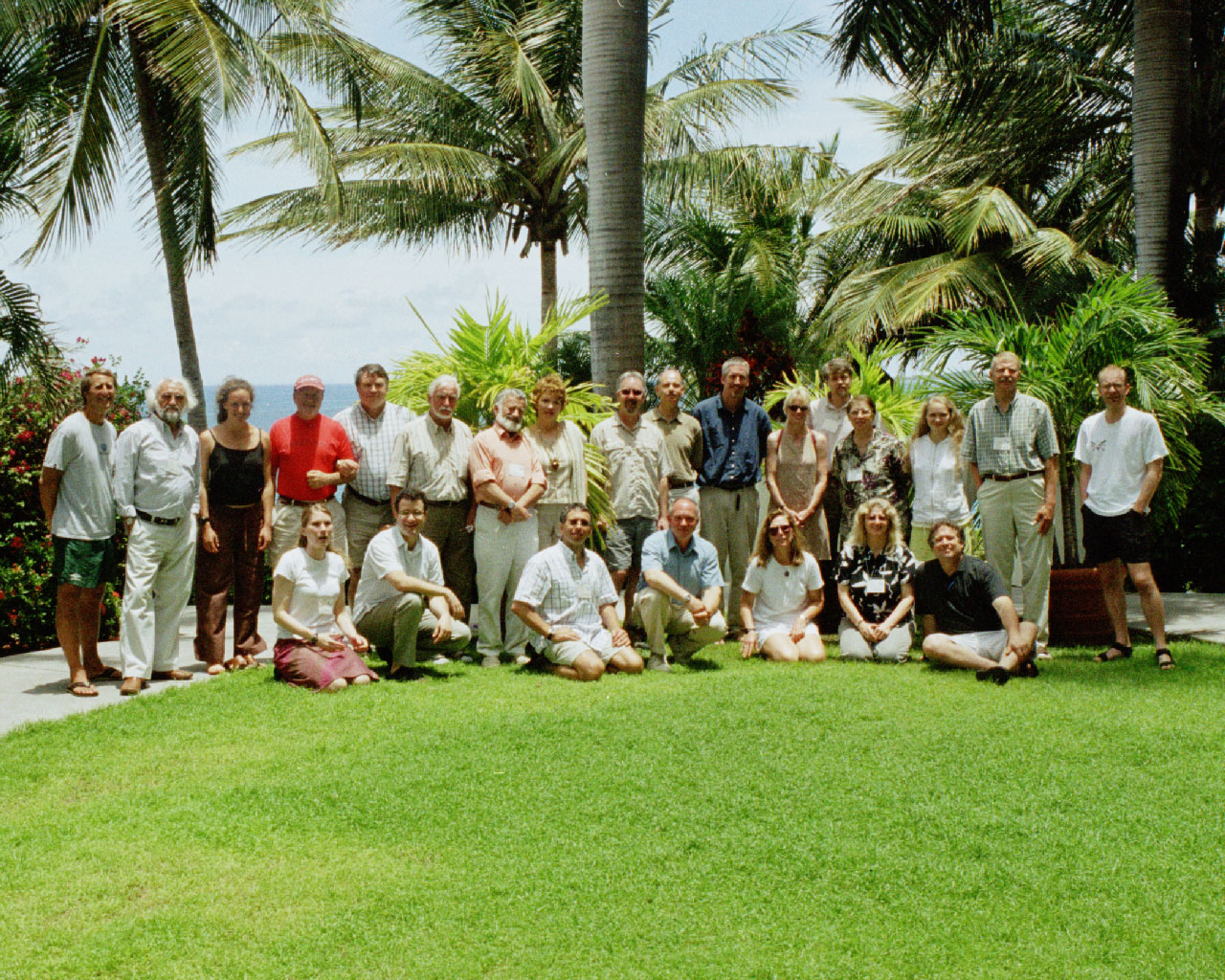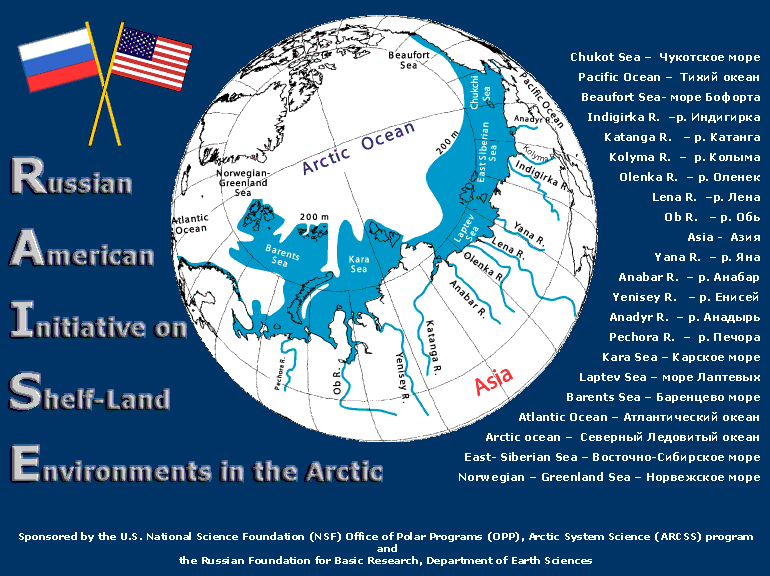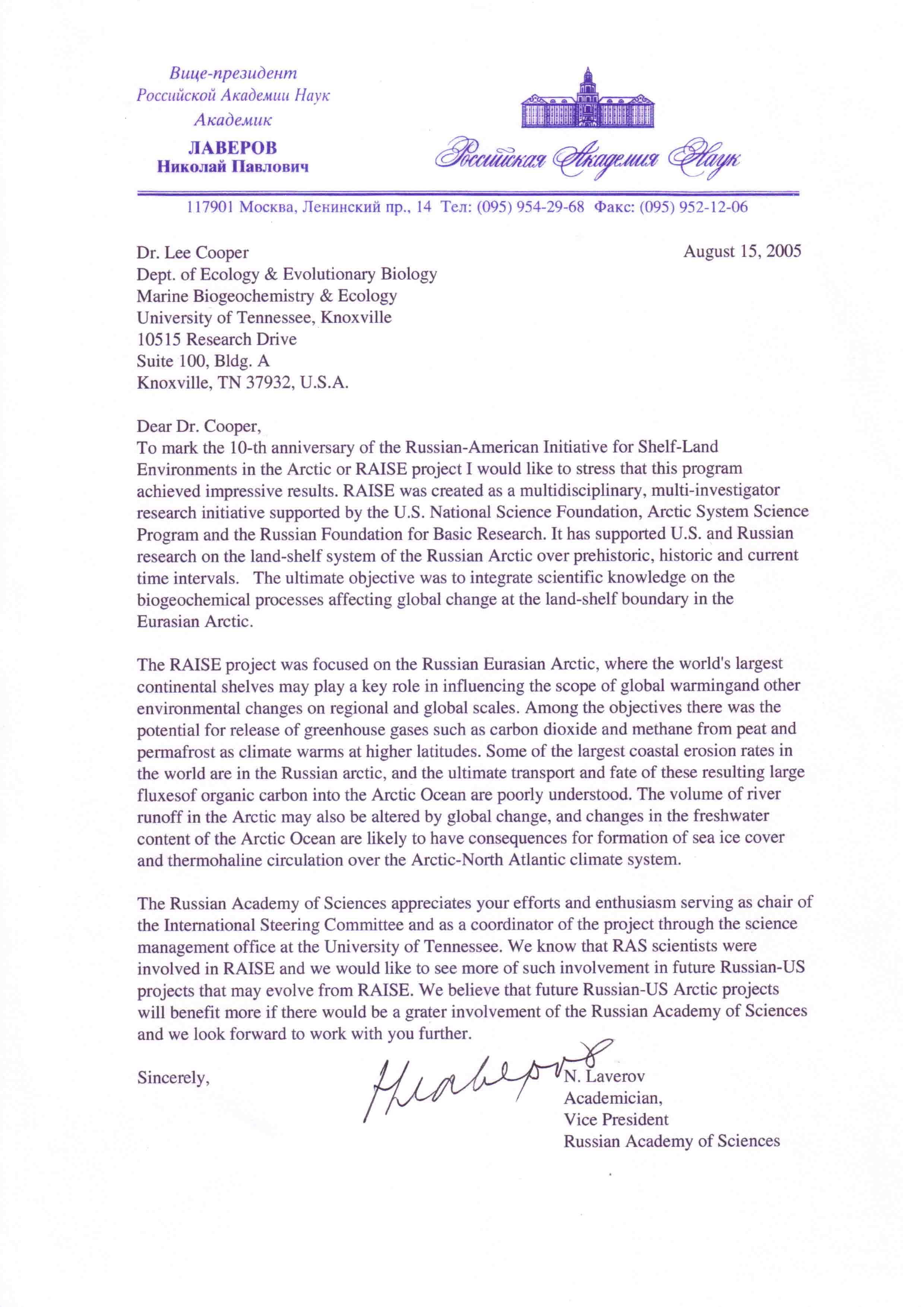|
| |
|
Disclaimer: The contents of this web page are the responsibility of the RAISE/LSI Project Office at the University of Tennessee, 10515 Research Drive, Suite 100, Knoxville TN 37932, U.S.A. and do not represent the policy or opinions of the funding agency or the U.S. and/or Russian governments Objective: To facilitate collaborative research between Russian and American scientists in order to understand processes and events in terrestrial, shelf, and ocean environments in northern Eurasia in the context of a globally changing environment Program History: RAISE was supported by the U.S. National Science Foundation and the Russian Foundation for Basic Research over a 10-year period as a mechanism to improve U.S. - Russian scientific collaborations in the Russian Arctic. U.S. funding for the RAISE Science Management Office ended on December 31, 2006 as part of a transition to facilitate U.S. - Russian field research in the Arctic through other mechanisms. In particular, overall science management activities and support for researchers funded through the Arctic System Science Program (ARCSS) of the U.S. National Science Foundation are increasingly being supported through a centralized ARCSS Science Management Office at the Arctic Research Consortium of the United States. Nevertheless, the RAISE website, including information on research supported, science plans developed, and selected research products and links, is being left intact on this server for the time being as an information resource. Program Overview:
RAISE was a multi-disciplinary research initiative that had the objective
of integrating scientific understanding of global change in the Arctic at
the land-sea boundary over prehistoric, historic, and current time frames.
It was focused on the Russian Eurasian Arctic, where the world's largest
continental shelves may play a key role in influencing the scope of global
warming and other environmental changes on regional and global scales.
Among the great unknowns that have been identified are the potential for
release of greenhouse gases such as carbon dioxide and methane from peat
and permafrost as climate warms at higher latitudes. Some of the largest
coastal erosion rates in the world are already occurring in the Russian
arctic, and the ultimate transport and fate of these resulting large
fluxes of organic carbon into the Arctic Ocean are poorly understood. The
volume of river runoff in the Arctic may also be altered by global change,
and changes in the freshwater content of the Arctic Ocean are likely to
have consequences for formation of sea ice cover and thermohaline
circulation over the Arctic-North Atlantic climate system. The retreat of
sea ice over the vast Eurasian continental shelves will also have direct
impacts on biological productivity, as well as higher trophic level marine
mammals and birds, and ultimately, subsistence communities in both Russia
and Alaska that are dependent upon current climate and hydrographic
patterns. Program highlights up until the spring of 2003 have been
summarized in an article in the
Arctic Research of the United States
Spring/Summer 2003 issue.
Note that because of the size of the document, it is easier to directly
download this .pdf file and use Adobe
Acrobat Reader to view and print it than to attempt to view it within
an Internet browser. These major research problems led to the development of the RAISE
program, following multiple open scientific workshops held in Russia and the United
States that were supported through the U.S. National Science Foundation
and the Russian Fund for Basic Research. A number of independent research
programs involving both Russian and American scientists were
initiated and completed in the Russian Arctic, particularly in terrestrial and riverine
systems. We recognized a need to develop more consistently and regularly
scheduled U.S. - Russian collaborations on the Eurasian continental
shelves. An international scientific steering committee consisting of both
Russian and U.S. specialists promoted all of these research efforts,
and a project office, located at the University of Tennessee, provided structural linkages and support for work conducted
under the RAISE framework. Science Plan for
Land-Shelf Interactions (LSI) Work was undertaken in 2000-2003 on a new science plan that
identified important research problems in Arctic coastal
zones that have not been well addressed in previous
environmental change research efforts on land and sea. This
science planning process involved multiple in-person, and
electronic workshops, iterative review and re-writing of a
science plan with substantive contributions made by
approximately 100 scientists from the worldwide research
community, including many of our Russian colleagues.
Important research topics to address were identified
including coastal erosion, permafrost stability, the fate
and transport of materials from the land-surface and within
runoff, as well as coastal oceanographic processes.
The science plan was completed and provided to the U.S.
National Science Foundation, which used some of these
scientific priorities for the development of an
Announcement of Opportunity for the
Study
of the Northern Alaska Coastal System (SNACS) that is
now underway in Alaskan coastal waters and adjacent
shoreline. The SNACS research program, while linked
and a partial result of our science planning efforts, is
separately coordinated through the
ARCSS science
management effort at the Arctic Research Consortium of the
United States. View or download the LSI Science Plan (date of revision: 11 March
2003) as a high-resolution print .pdf
file (10 MB) or as a
screen-optimized .pdf (825 K) file. A bibliography of recent references (1990-2003) supporting this science planning effort is available for downloading or viewing here in a variety of formats. These scientific references are not all-inclusive and were simply used as a tool for developing the science plan.
U.S. - Russia Research Facilitation Workshop, 11 June-16 June 2005, St. Thomas, US Virgin Islands One of the key challenges throughout the history of the RAISE project, and in a larger sense for all U.S. and Russian researchers wishing to work together, have been governmental, logistical, and administrative barriers to undertaking joint field research in the Arctic. The RAISE project office sponsored a workshop to bring together U.S. and Russian scientists as well as bi-national agency and Russian Academy personnel in June 2005 to articulate and describe those challenges, possible solutions, as well as to seek higher-level support in both the United States and Russia for bilateral research on arctic environmental change. A workshop report, as well as one or two policy-oriented papers that will be submitted to professional journals are in preparation as a result of the meeting. These formal reports will be used to communicate a number of broad conclusions and needs that were identified during the workshop for improvement of U.S. and Russian collaborative research efforts in the Arctic. One of the concerns expressed is the apparent declining support for joint U.S. - Russian collaborative research in the Arctic. Particularly right after the fall of the Soviet Union in the early 1990's many U.S. and Russian scientists worked together on environmental change research problems in the Arctic, supported by U.S. agencies such as the NSF, the US Office of Naval Research, NOAA, and other agencies. This workshop stimulated some additional database search activities to go beyond the anecdotal stories and evaluate whether support from U.S. agencies for U.S. - Russian collaborative research in the Arctic is actually in decline. The FastLane award database of the NSF provides a good objective basis for evaluating funding trends within NSF, the single largest funding source for arctic research in the United States. The funding patterns observed since the early 1990's for joint U.S. - Russian research projects in the Arctic are not all-together positive and may merit additional attention. The initiation of new grants with U.S. and Russian investigators has been limited with an overall declining trend over the past several years. In addition, the total funding used to support research in the Russian Arctic has never been more than a small fraction of overall Arctic efforts that NSF has supported, even though the Russian Arctic is disproportionately important to understanding the Arctic System. See FastLane data analysis here.  Participants in the U.S. - Russia International Research
Facilitation Workshop, St. Thomas, US Virgin Islands,
June 2005
Participants in the U.S. - Russia International Research
Facilitation Workshop, St. Thomas, US Virgin Islands,
June 2005
Another immediate result of the workshop has been an affirmation of support for the work of the RAISE project in helping to facilitate U.S. - Russian joint research in the Arctic from Academician N. Laverov, Vice-President of the Russian Academy of Sciences (below)
Selected U.S.-RAISE funded
projects (1995-2005):
Bruce J. Peterson, Robert M. Holmes, Marine Biological Lab Cort Willmott, University of Delaware Mark Serreze, University of Colorado Igor Shiklomanov, State Hydrological Institute Charles Vorosmarty, Richard Lammers, Alexander Shiklomanov, Balazs Fekete, University of New Hampshire This project is completed; information on the currently funded, and related PARTNERS project is available at http://ecosystems.mbl.edu/partners ALSO:
Sources of Information for Scientific Fieldwork in the Russian Arctic International Arctic Science Committee: RAISE participates in the International Arctic Science Committee's efforts to improve bilateral, international research in the Russian Arctic through its International Scientific Initiative in the Russian Arctic (ISIRA). Our participation has been in part supported by the Polar Research Board of the U.S. National Academy of Sciences. One of our contributions to improving the information available for current and prospective researchers in the Russian Arctic has been to identify all current collaborative projects or programs funded by any agency that are being conducted jointly by U.S. and Russian researchers in the Russian Arctic. A Microsoft Word version can also be downloaded here. Please contact Lee Cooper with details on new or updated information. This list of joint U.S. - Russian collaborative projects in the Arctic is updated annually each September. View an extended list of Russian-funded projects Russian scientists who have been funded to undertake work in the Arctic through the Russian Foundation for Basic Research are likely to be knowledgeable contacts in Russia for foreign investigators. In addition to the web link for Russian-funded projects, above, this information is also available in the publication, Basic Research in Arctic Region, Digest of Summaries and Bibliography of RFBR Grants, 1997-2000, edited by Professor N. Romanovskii. Publisher, Yanus-K, Moscow, 2002. Summaries of all Arctic projects funded are available in Russian (Part 1), in English (Part 2), together with a bibliography of papers produced (Part 3). Copies of this 548 page book are available for distribution in the United States from the RAISE Management Office. Please contact Lee Cooper lcooper1@utk.edu for a copy. Documentation for scientific research permits in Russia: RAISE SMO introduction to conducting scientific research in Russia (40 Mb MS Word document) Russian Federation regulations on conducting scientific research in Russia View a flowchart of the request process Organizational support: The Arctic Sciences Section of the National Science Foundationís (NSF) Office of Polar Programs (OPP) and the NSF Directorate for Geosciences (GEO), in partnership with the U.S. Civilian Research and Development Foundation (CRDF), have established a Cooperative Programs/Science Liaison Office in Moscow. This Office provides on-site support of OPP- and GEO-sponsored cooperative activities in Russia in the geosciences and in Arctic research. Two other entities, the Barrow Arctic Science Consortium and VECO Polar Resources also potentially can provide logistical and other research support for U.S. scientists funded by the U.S. National Science Foundation in Russia through contracts that these organizations have with the NSF. New book: Another useful information resource for researchers working in the Russian Far East is a recent (2004) book published by Daniel and Daniel, Publishers (PO Box 2790, McKinleyville CA 95519, USA), The Russian Far East, A Reference Guide for Conservation and Development, by Josh Newell; more information is available at http://www.rfebook.com. Although the volume is particularly oriented towards biodiversity and conservation problems in the context of resource development, it will be widely useful for scientists planning field work in the Russian Far East. Publications available on this website describing work of RAISE steering committee and management office:
| |
| Science Steering Committee | Science Management
Office:
Dr. Lee Cooper Telephone: +1.865.974.2990 |
|
Related Links:
This material is based upon work supported by the National Science Foundation under Grant No. OPP-0228646. Any opinions, findings, conclusions, or recommendations expressed in the material are those of the author(s) and do not necessarily reflect the views of the National Science Foundation.
| |

